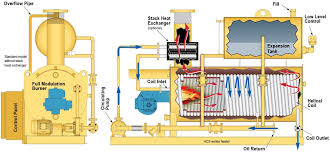
Sep . 06, 2024 10:21 Back to list
Hot Water Boiler Efficiency
Understanding Hot Water Boiler Efficiency
Hot water boilers are essential components in residential and commercial heating systems, providing comfort and warmth during colder months. However, the efficiency of these systems can significantly impact energy consumption and operational costs. Understanding hot water boiler efficiency is crucial for optimizing performance and achieving cost savings.
Boiler efficiency is generally defined as the ratio of useful energy output to the energy input, expressed as a percentage. For hot water boilers, this often refers to how effectively the boiler converts fuel (such as natural gas, propane, or oil) into heat. A higher efficiency rating indicates that more of the energy content is being used for heating water, while a lower rating suggests greater energy loss.
There are several factors that influence the efficiency of hot water boilers. One critical aspect is the design of the boiler itself. Modern condensing boilers, for example, utilize advanced technology that allows them to recover exothermic heat from the combustion process. This results in efficiency ratings that can exceed 90%, substantially reducing fuel consumption compared to traditional non-condensing boilers.
hot water boiler efficiency

Another significant factor affecting efficiency is proper installation and maintenance. A poorly installed boiler may lead to inadequate heat distribution, increased fuel usage, and safety concerns. Regular maintenance, including cleaning and inspection of components, can help ensure that the boiler operates at peak efficiency. Tasks such as descaling, checking for leaks, and ensuring that safety mechanisms are functioning are vital for prolonging the life of the system and optimizing efficiency.
Additionally, the operational practices can have a marked effect on boiler efficiency. For instance, ensuring the system operates at optimal temperatures and pressures can enhance performance. Using programmable thermostats can also help manage heating demands more effectively, preventing unnecessary heating when it's not needed.
Investing in a high-efficiency hot water boiler can result in significant cost savings on energy bills. Though the upfront costs may be higher, the long-term savings and environmental benefits make it a worthwhile consideration for many homeowners and businesses. Furthermore, government incentives and rebates for energy-efficient appliances can alleviate the initial financial burden, promoting widespread use of these modern systems.
In conclusion, understanding hot water boiler efficiency involves recognizing various influencing factors, from the design and installation to ongoing maintenance and operational practices. By prioritizing efficiency, users can enjoy greater comfort, reduced energy costs, and contribute to environmental sustainability. As technology advances, the future of hot water boiler systems looks promising, offering even more ways to conserve energy and reduce expenses.
-
High-Efficiency Commercial Oil Fired Steam Boiler for Industry
NewsJul.30,2025
-
High-Efficiency Biomass Fired Thermal Oil Boiler Solutions
NewsJul.30,2025
-
High Efficiency Gas Fired Thermal Oil Boiler for Industrial Heating
NewsJul.29,2025
-
High-Efficiency Gas Fired Hot Water Boiler for Sale – Reliable & Affordable
NewsJul.29,2025
-
High Efficiency Biomass Fired Hot Water Boiler for Industrial and Commercial Use
NewsJul.29,2025
-
High-Efficiency Biomass Fired Hot Water Boiler for Industrial Use
NewsJul.28,2025
Related PRODUCTS






















